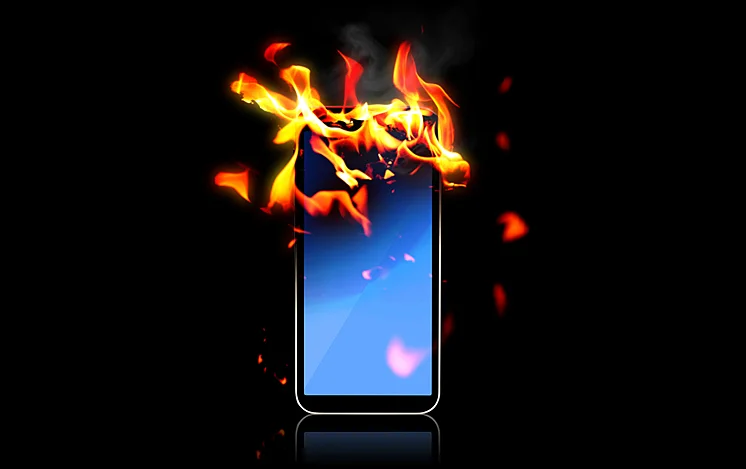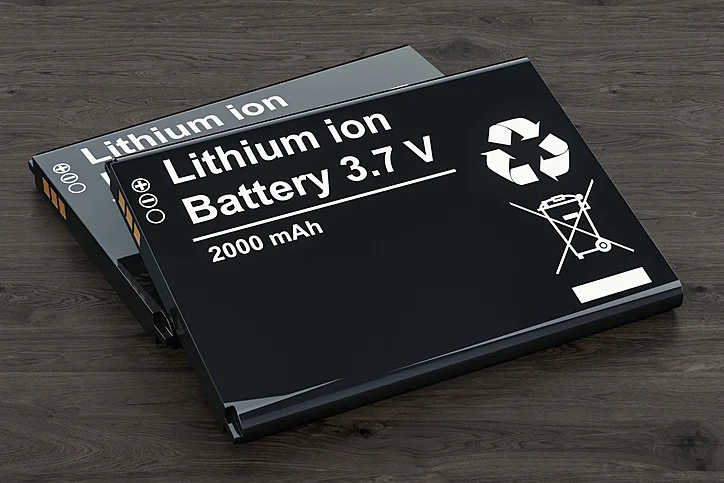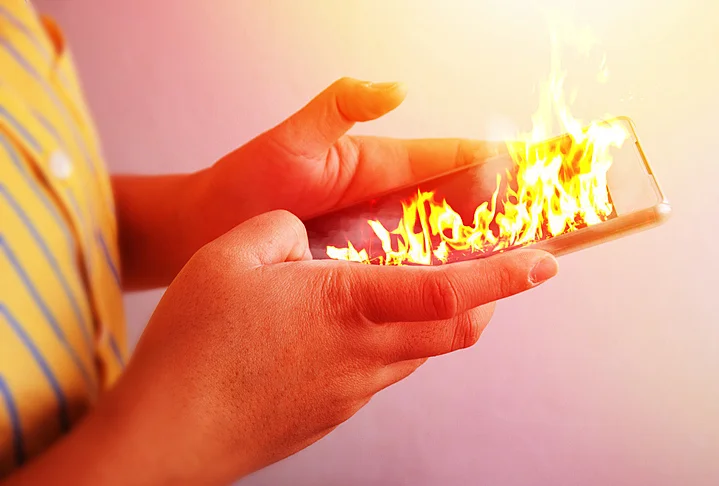You may be entitled to compensation by filing an exploding phone battery lawsuit and our product liability litigation group can help. Please click the button below for a Free Confidential Case Evaluation or call our law firm toll-free 24 hrs/day by dialing (866) 588-0600.
Most people rely on their smartphones daily, but few consider the potential risks posed by a failing battery. Faulty or damaged batteries can cause serious hazards, including overheating, swelling, and, in extreme cases, fires or explosions. Identifying the warning signs early can prevent accidents and protect both you and your device.
Table Of Contents
- Exploding Phone Battery Lawsuit Overview
- Latest Exploding Phone Battery Lawsuit Updates
- CPSC Reports and Statistics
- Exploding Phone Battery Injuries & Hazards
- Understanding Lithium-Ion Battery Dangers
- Notable Cases of Exploding Phone Batteries
- What To Do If Your Phone Overheats
- Statute of Limitations for Exploding Phone Battery Lawsuits
- FAQs
- 1. How Do I Know if My Phone Model Is Prone to Battery Explosions?
- 2. What Kind of Injuries Can Result From an Exploding Phone Battery?
- 3. Is There a Statute of Limitations for Filing an Exploding Phone Battery Lawsuit?
- 4. Can I Join a Class Action Lawsuit for Battery Explosions?
- 5. What Evidence Do I Need for a Battery Explosion Lawsuit?
- 6. How Much Compensation Can I Receive?
- 7. Are Manufacturers Liable for Battery Defects?
- 8. What Should I Do Immediately After a Battery Explosion?
- 9. Can I Sue for Property Damage from a Battery Fire?
- 10. How Long Do Battery Explosion Lawsuits Take?
- Get an Exploding Phone Battery Lawsuit Evaluation With Our Lawyers
Exploding Phone Battery Lawsuit Overview
Exploding phone battery lawsuits involve legal claims against smartphone manufacturers for defective lithium-ion batteries that cause fires, explosions, or serious injuries. The primary allegations center on manufacturing defects, inadequate safety testing, and failure to warn consumers about potential dangers. Over 112 Samsung Galaxy Note 7 devices caught fire due to battery defects in 2016, leading to one of the largest smartphone recalls in history. The Consumer Product Safety Commission has confirmed multiple incidents of spontaneous phone fires, with regulatory bodies issuing safety warnings about the risks of lithium-ion battery failures [1].
Latest Exploding Phone Battery Lawsuit Updates
- January 2025 – The International Electrotechnical Commission (IEC) has updated industry standards for lithium-ion batteries, focusing on enhanced safety testing and performance criteria to prevent future large-scale recalls [2].
- May 2022 – A class action lawsuit has been filed in the Eastern District of Texas by Robert Franklin, who claims that his iPhone 6 battery exploded, causing severe burn injuries. The lawsuit alleges breach of warranty and deceptive trade practices, with Franklin seeking compensation for personal injuries and economic losses related to the defective battery [3].
- 2016 – Samsung suspended sales of the Galaxy Note 7 after at least 112 devices caught fire due to battery defects, resulting in a $5.3 billion financial impact and permanent discontinuation of the model [4].
- The global lithium-ion battery market produces over 2 billion batteries annually, raising concerns about quality control and increased risk of battery-related incidents. Consumer awareness surveys indicate that 89% of mobile users are unaware of the risks posed by substandard chargers, while 14% of Americans admit to sleeping with their phones under their pillows, increasing fire hazards.
CPSC Reports and Statistics
The Consumer Product Safety Commission has documented significant concerns regarding lithium-ion battery safety in consumer electronics. Between 2002 and 2004, 83 mobile phone battery fires were reported in the United States alone. Recent data shows that 27% of phone fires occur when batteries are physically damaged, while 23% stem from manufacturing defects and poor quality control.
According to the National Fire Protection Association, 24% of cell phone fires are caused by improper charging or using low-quality chargers. Over 30 airlines banned the use and charging of the Samsung Galaxy Note 7 due to fire risks after the Consumer Product Safety Commission confirmed 39 spontaneous phone fires in the U.S. in 2015.
A 2017 study found that smartphone batteries can reach temperatures up to 130°F (54°C) while charging, creating potential fire hazards. Survey data indicates that one in four Americans may have experienced an overheating phone battery at some point.
Exploding Phone Battery Injuries & Hazards
Phone battery explosions can result in severe injuries and long-term health complications due to the toxic chemicals and extreme heat generated during thermal runaway.
Serious side effects reported include:
- Severe Burns: Second and third-degree burns requiring extensive medical treatment and potential skin grafting
- Chemical Exposure: Exposure to toxic electrolytes that can cause skin burning and respiratory issues
- Permanent Disfigurement: Scarring and nerve damage affecting hand function and appearance
- Smoke Inhalation: Respiratory complications from inhaling toxic fumes during battery combustion
Understanding Lithium-Ion Battery Dangers
What is a Lithium Ion Battery?
Lithium-ion batteries have become essential in modern technology, powering smartphones, tablets, and electric vehicles. These batteries function by allowing lithium ions to move between electrodes to generate power. Their lightweight nature and high energy density make them ideal for portable devices, but they also present significant safety challenges.
Why Are Lithium-Ion Batteries Dangerous?
According to the US Consumer Product Safety Commission, problems with phone batteries often stem from manufacturers pushing devices to maximize energy storage while minimizing charging time and cost. Inside the battery, only a thin, porous strip of polypropylene prevents dangerous short-circuiting by keeping electrodes from touching.
Phone batteries contain flammable electrolytes that can combust with heat and flame out of control once oxygen reaches them. Lithium-ion batteries also contain liquids mixed with skin-burning compounds that can cause severe burn injuries.
What’s the Problem with Exploding Lithium Ion Batteries?
When lithium-ion batteries catch fire and/or explode, they do so for 2 main reasons:
- Punctures, which typically occur when a person drops their phone, can cause it to catch fire
- Breaks in the thin compacted battery material between cells can produce an internal short circuit, leading to swelling and phone battery explosions
Notable Cases of Exploding Phone Batteries
Samsung Galaxy Note 7 Recall (2016)
One of the most infamous battery-related recalls in history, Samsung suspended sales of the Galaxy Note 7 in September 2016 after multiple reports of devices overheating, catching fire, or exploding surfaced. Investigations found that manufacturing defects in the batteries caused them to generate excessive heat, leading to combustion [5].
- Samsung initially replaced the devices with batteries from a different supplier, but new incidents forced a worldwide recall on October 10, 2016
- The financial impact was estimated at $5.3 billion, with 96% of devices returned globally
- The Galaxy Note 7 was permanently discontinued, marking one of the largest smartphone recalls in history
T-Mobile Basketball Player Case – Career-Ending Explosion
Professional basketball player Khouraichi Thiam filed a product liability lawsuit against T-Mobile, LG Electronics, and MetroPCS after his phone exploded in his hand without warning on May 15 while riding in a friend’s car.
- Thiam suffered second and third-degree burns along with permanent damage to his thumb, index, and middle fingers
- His injuries ended his basketball career, leaving him uncertain about his future
- The lawsuit, Thiam v. T-Mobile USA Inc. et al., case number 4:19-cv-00633, was filed in Texas federal court
“It just blew up,” Thiam said, recalling the event. “It exploded with an electrical spark. The driver, who is my friend, was screaming. We all were screaming. I thought I was going to die. It was … it was terrifying. I’m a basketball player, and I work. This is how I provide for my family. It’s scary right now, I don’t know what I’m going to do” – Thiam Stated
Apple iPhone 6s Recall (2017)
In January 2017, Apple recalled certain iPhone 6s models after identifying a battery defect that caused devices to shut down unexpectedly.
- The recall affected approximately 90,000 units sold between September and October 2015
- Apple provided free battery replacements for affected customers as part of the recall program
What To Do If Your Phone Overheats
If your cell phone overheats, hisses, or bulges, take the device out of your pocket and place it away from flammable materials. If possible, remove the battery and put it safely outside to let it burn out. Simply disconnecting the phone from its power source/charger may not be enough to stop it from overheating.
Related Article: iPhone Battery Explosion Lawsuit
Statute of Limitations for Exploding Phone Battery Lawsuits
Every state has a statute of limitations, which is the deadline for filing a legal claim. Depending on the type of claim—personal injury, property damage, or product liability—this deadline may range from one to several years. If you wait too long, you may lose your right to seek compensation, so taking immediate legal action is crucial.
Different states have varying regulations regarding product liability and consumer protection. Some states impose strict liability on manufacturers, meaning they can be held responsible for any injuries caused by their product, regardless of negligence.
FAQs
1. How Do I Know if My Phone Model Is Prone to Battery Explosions?
Check manufacturer recalls, safety warnings, consumer reports, and online reviews. Known incidents or recalls can indicate if your phone model is prone to battery explosions.
2. What Kind of Injuries Can Result From an Exploding Phone Battery?
Injuries include burns, lacerations, and potential chemical exposure. Severe cases can lead to disfigurement, nerve damage, or other long-term health complications.
3. Is There a Statute of Limitations for Filing an Exploding Phone Battery Lawsuit?
Yes, statutes vary by state but typically range from one to four years after the injury or discovery of damages.
4. Can I Join a Class Action Lawsuit for Battery Explosions?
If multiple consumers have been harmed by the same phone model or battery defect, you may be able to join a class action lawsuit against the manufacturer.
5. What Evidence Do I Need for a Battery Explosion Lawsuit?
You’ll need medical records, photos of the damaged device, witness statements, purchase receipts, and documentation of any manufacturer recalls or safety warnings.
6. How Much Compensation Can I Receive?
Compensation depends on the severity of injuries, medical expenses, lost wages, and property damage. Settlements can range from thousands to millions of dollars.
7. Are Manufacturers Liable for Battery Defects?
Yes, manufacturers can be held liable for defective products under product liability laws, regardless of whether they were negligent in the design or manufacturing process.
8. What Should I Do Immediately After a Battery Explosion?
Seek medical attention, document the incident with photos, preserve the damaged device, and contact a product liability attorney as soon as possible.
9. Can I Sue for Property Damage from a Battery Fire?
Yes, you can seek compensation for property damage caused by battery fires, including damage to your home, car, or other personal belongings.
10. How Long Do Battery Explosion Lawsuits Take?
Lawsuit timelines vary, but most cases resolve within 1-3 years through settlement or trial, depending on the complexity of the case and willingness to negotiate.
Get an Exploding Phone Battery Lawsuit Evaluation With Our Lawyers
The Product Liability Litigation Group at Schmidt & Clark, LLP law firm is an experienced team of trial lawyers that focus on the representation of plaintiffs in exploding phone battery lawsuits. We are handling individual litigation nationwide and currently accepting new injury and property damage cases in all 50 states.
Our legal team offers:
- Free, confidential consultations to evaluate your case
- No upfront costs or fees – we only get paid if you win
- Experienced representation in complex product liability cases
- Nationwide handling of battery explosion lawsuits
If you or a loved one has been injured by an exploding phone battery, don’t wait. Contact our experienced legal team today to understand your rights and explore your options for compensation. The sooner you act, the better we can protect your interests and fight for the justice you deserve.
References:
- https://www.cpsc.gov/Newsroom/News-Releases/2021/CPSC-Issues-Consumer-Safety-Warning-Serious-Injury-or-Death-Can-Occur-if-Lithium-Ion-Battery-Cells-Are-Separated-from-Battery-Packs-and-Used-to-Power-Devices
- https://webstore.iec.ch/en/publication/71814
- https://topclassactions.com/lawsuit-settlements/consumer-products/cellphones/breaking-apples-iphone-6-battery-caused-explosion-that-burnt-mans-eyes-and-wrist-class-action-claims/
- https://www.bbc.com/news/business-38714461
- https://www.nbcnews.com/tech/tech-news/samsung-finally-explains-galaxy-note-7-exploding-battery-mess-n710581

 Published by
Published by 

